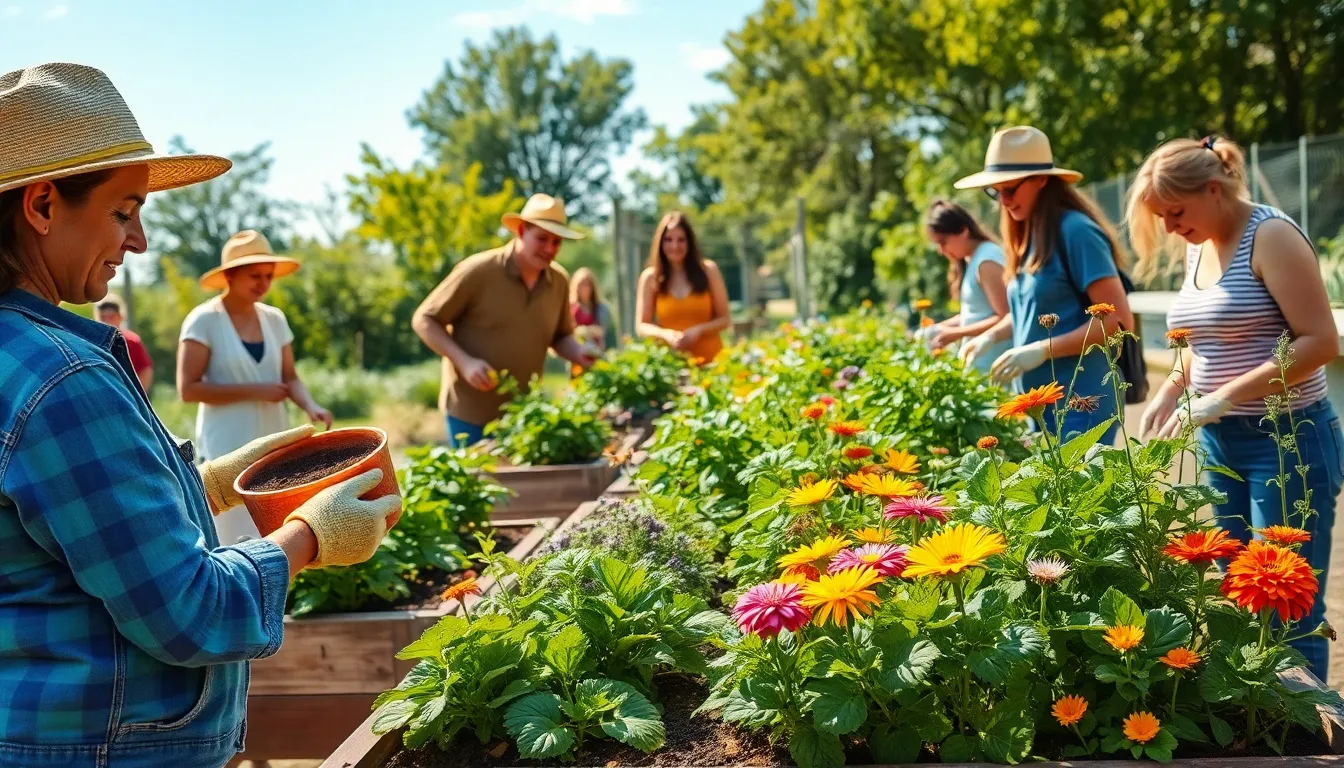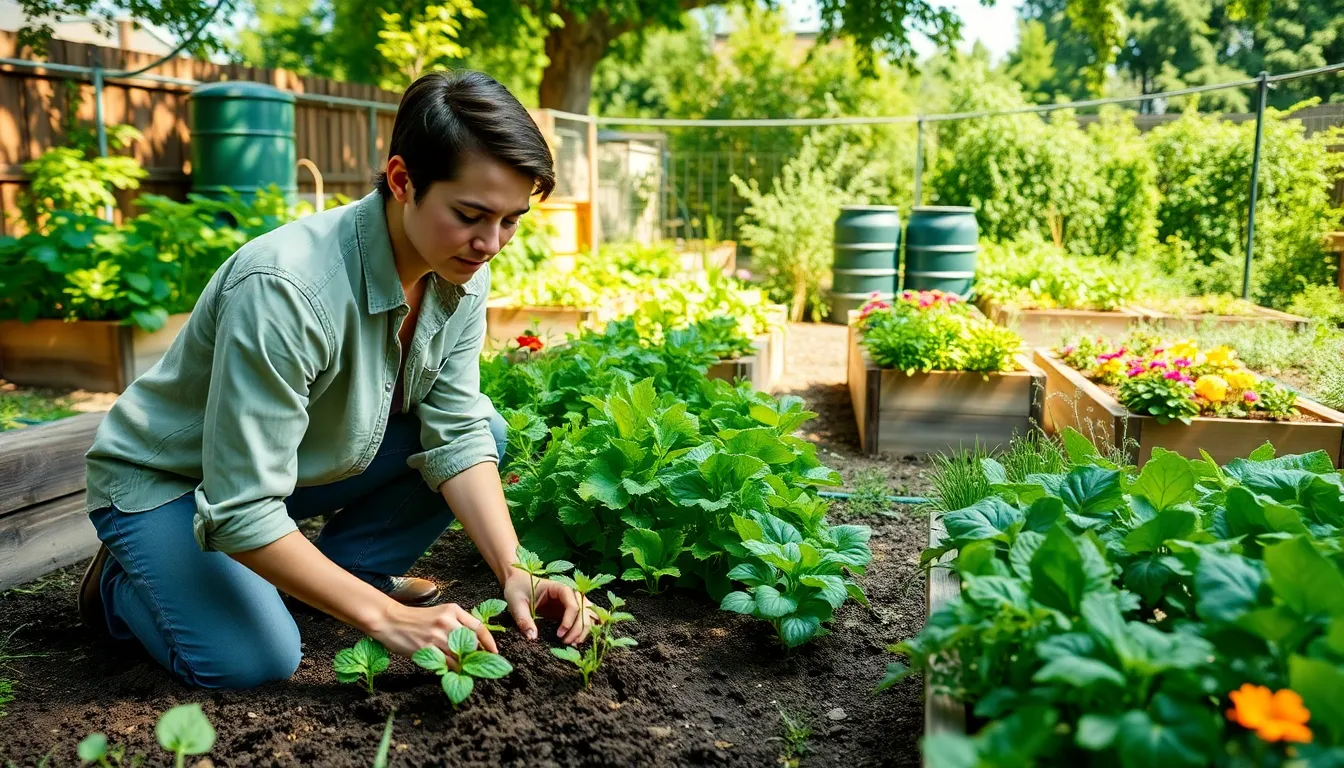Ever thought about trading in that asphalt jungle for your very own slice of green heaven? With sustainable gardening, you can do just that. Not only does it help the planet, but it also gives you fresh produce (because who doesn’t want a tomato with their name on it?). The best part? You don’t need to be a horticultural wizard to get started. Roll up those sleeves, grab a spade, and prepare to dig into the world of eco-friendly gardening.
Sustainable Gardening for Beginners

Sustainable gardening is more than just a buzzword thrown around by the green-thumbed elite. It’s a method of gardening that aims to meet the needs of the present without compromising the ability of future generations to do the same. This approach focuses on creating a harmonious relationship between plants, animals, and the environment.
Rather than relying on chemical fertilizers or pesticides, sustainable gardening utilizes natural methods to cultivate healthy plants. Think compost, natural pest predators, and organic fertilizers. By considering the entire ecosystem, sustainable gardeners work to foster a garden that can thrive on its own, creating a balance that benefits not just their plots but the wider community and environment.
Benefits Of Sustainable Gardening
The perks of sustainable gardening extend beyond merely planting seeds. It’s a practice that resonates positively throughout the environment and the gardener’s well-being. Here are some key benefits:
- Eco-Friendly Practices: Sustainable gardening reduces reliance on synthetic chemicals, encouraging biodiversity and healthier ecosystems.
- Cost-Effective: Growing your own fruits and vegetables can significantly cut grocery bills. Plus, composting kitchen scraps and yard waste saves money on disposal and enriches garden soil.
- Healthier Produce: By growing organically, gardeners can enjoy fresh, nutrient-rich vegetables and fruits free from harmful pesticides and chemicals.
- Community Engagement: Joining local gardening groups fosters connections with like-minded individuals, sharing knowledge and even produce while cultivating community spirit.
- Personal Peace: Gardening can be therapeutic. Spending time among plants reduces stress, improves mood, and encourages an active lifestyle.
Getting Started With Sustainable Gardening
Starting a sustainable garden might seem overwhelming, but breaking it down into simple steps can make the process manageable and enjoyable. Here’s how to immerse:
Essential Techniques For Sustainable Gardening
To begin, understanding key techniques in sustainable gardening is crucial. Techniques such as crop rotation, permaculture, and companion planting ensure that the garden remains diverse and resilient. Composting, mulching, and using organic pest control can also drastically improve soil health and fertility without resorting to harmful chemicals.
Choosing The Right Plants
Choosing native plants that are adapted to the local climate and soil can ease maintenance efforts while boosting local wildlife, like beneficial insects and birds. Consider including a mix of perennials for year-round yield and annuals for seasonal diversity.
Soil Health And Management
Healthy soil is the foundation of a sustainable garden. Regularly adding organic matter, such as compost and mulch, improves soil fertility and structure. Conducting soil tests helps identify nutrient deficiencies and ensures that the organic amendments applied are effective.
Water Conservation Strategies
Water conservation is vital for a sustainable garden, especially in areas prone to drought. Implementing strategies that conserve water can help maintain a healthy garden without excessive irrigation.
- Rain Barrels: Collect and store rainwater from gutters to water your garden naturally.
- Drip Irrigation: This system delivers water directly to the plant’s roots, reducing waste.
- Mulching: A layer of organic mulch can keep soil moist and reduce evaporation, while also suppressing weeds.
- Watering Wisely: Performing watering in the early morning or late evening minimizes evaporation, allowing more moisture to reach plant roots.
Maintaining A Sustainable Garden
Once established, sustainable gardens require consistent maintenance to thrive. Here are some tips to keep your garden flourishing:
- Regularly monitor plant health, checking for signs of pests or diseases.
- Practice succession planting to ensure continuous harvest throughout the seasons.
- Keep a garden journal, documenting successes, challenges, and weather patterns can improve future planting decisions.
- Encourage wildlife by adding birdhouses or insect hotels to bolster biodiversity.
- Experiment with different techniques as gardening is a constant learning journey.

